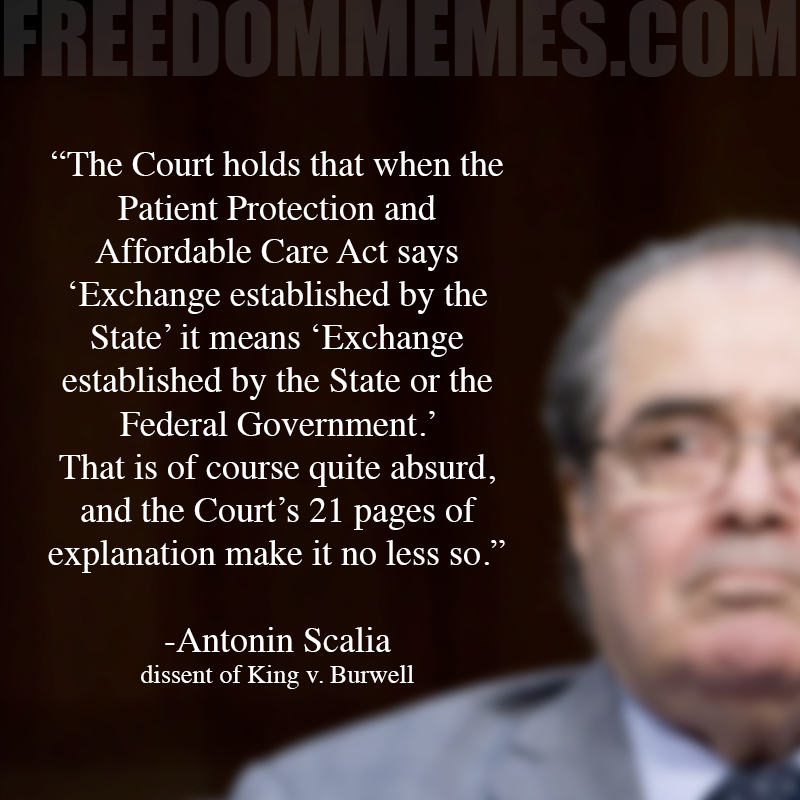Scalia Pens Scathing Dissent to Obamacare Decision

Once again, the Supreme Court proves that words are increasingly meaningless and we are closer to a land of arbitrary lawlessness. Justice Scalia says it better:
The Court holds that when the Patient Protection and Affordable Care Act says “Exchange established by the State” it means “Exchange established by the State or the Federal Government.” That is of course quite absurd, and the Court’s 21 pages of explanation make it no less so.
Full Text:
Other highlights:
Words no longer have meaning if an Exchange that is not established by a State is “established by the State.”
But normal rules of interpretation seem always to yield to the overriding principle of the present Court: The Affordable Care Act must be saved.Let us not forget, however,why context matters: It is a tool for understanding the terms of the law, not an excuse for rewriting them.
So saying that an Exchange established by the Federal Government is “established by the State” goes beyond giving words bizarre meanings; it leaves the limiting phrase “by the State” with no operative effect at all.. . . Lawmakers sometimes repeat themselves—whether out of a desire to add emphasis, a sense of belt-and-suspenders caution, or a lawyerly penchant for doublets (aid and abet, cease and desist, null and void). Lawmakers do not, however, tend to use terms that “have no operation at all.”
The Court’s next bit of interpretive jiggery-pokery involves other parts of the Act that purportedly presuppose the availability of tax credits on both federal and state Exchanges.
If true, these projections wouldshow only that the statutory scheme contains a flaw; they would not show that the statute means the opposite of what it says.
Perhaps sensing the dismal failure of its efforts to show that “established by the State” means “established by the State or the Federal Government,” the Court tries to palm off the pertinent statutory phrase as “inartful drafting.”
Let us not forget that the term “Exchange established by the State” appears twice in §36B and five more times in other parts of the Act that mention tax credits. What are the odds, do you think, that the same slip of the pen occurred in seven separate places?
The Court’s decision reflects the philosophy that judges should endure whatever interpretive distortions it takes in order to correct a supposed flaw in the statutory machinery. That philosophy ignores the American people’s decision to give Congress “[a]ll legislative Powers” enumerated in the Constitution.
Even less defensible, if possible, is the Court’s claim that its interpretive approach is justified because this Act “does not reflect the type of care and deliberation that one might expect of such significant legislation.”
Today’s opinion changes the usual rules of statutory interpretation for the sake of the Affordable Care Act.
The somersaults of statutory interpretation they have performed will be cited by litigants endlessly, to the confusion of honest jurisprudence. And the cases will publish forever the discouraging truth that the Supreme Court of the United States favors some laws over others, and is prepared to do whatever it takes to uphold and assist its favorites.I dissent.
Judge Napalitano’s take:
https://www.youtube.com/watch?v=rCLCf795ovo








